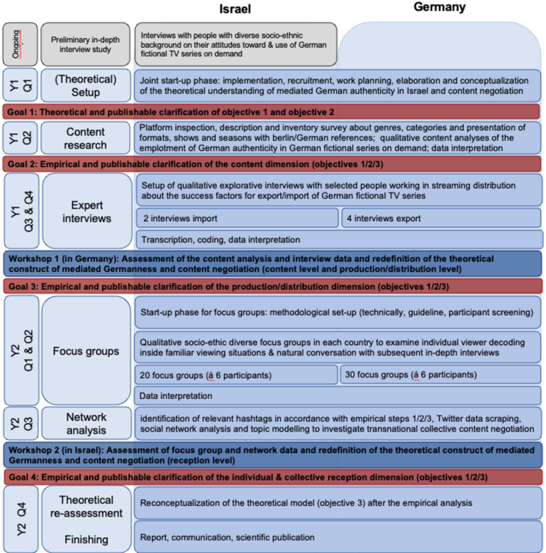From Dallas to Berlin on Demand: The Transnationalization of Meaning? A Multilevel Replication Study in Israel and Germany
Department of Political and Social Sciences
Institute for Media and Communication Studies
Division Media Analysis/ Research Methods
About the Project:
The research project 'From Dallas to Berlin on Demand' replicates and updates Liebes and Katz's seminal study, 'The Export of Meaning: Cross-Cultural Readings of Dallas' (1990).
Building on Liebes’ and Katz’s approach, this project adapts their methodology to the digital age, examining the transnational audiences of German television series, specifically the so-called Berlin series. The new digital context redefined the viewing experience and also shapes the manner of production, distribution and content. This means that we will not only contribute to insights into the level of viewer involvement but also into the parasocial embedding of content, nationally, transnationally, in private and on social media.
By updating and complementing one of the most influential research paradigms in audience studies, this research refreshes Liebes’ and Katz’s study and thus makes it highly relevant for today’s streaming reality. The project investigates the transformation of media consumption with the rise of streaming video on demand (SVoD) and the mediated relations between Germany and Israel through Berlin.
Led by Prof. Dr. Joachim Trebbe of the Freie Universität Berlin and Prof. Dr. Gisela Dachs of the Hebrew University of Jerusalem, this interdisciplinary collaboration aims to provide new insights into how audiences in different cultural contexts decode and engage with German TV series.
Funding and Duration:
The project is funded by the German Research Foundation (DFG) and will run for two years. It is divided into three phases:
In the first phase, the project team conducts a theoretical setup and qualitative content analysis of German TV series, focusing on the representation of “Berlin” and “Germanness.” This phase involves a detailed examination and categorization of themes within the selected TV series.
The second phase involves expert interviews with industry professionals in Germany and Israel to gain insights into the production and distribution strategies that contribute to the global success of these TV series.
The third phase focuses on understanding audience reception and decoding through focus groups and social media analysis. The aim of this phase is to map collective decoding processes and transnational media effects to gain a comprehensive understanding of how different cultural groups interpret and engage with German TV content.
The findings from all phases will be synthesized to provide new insights into transnational media consumption in the streaming era.
Project Work Program and Research Methods:

Figure: Work Program and Methodological Setup
